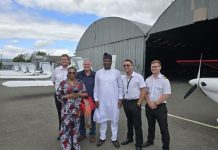We are meeting at a challenging time for the air cargo business.
To begin with, key performance numbers are not moving in the right direction. After a decade in the doldrums, air cargo had an amazing 2017, with 9.7% growth.
Extraordinary circumstances in the re-stocking cycle supported that boost. That situation gradually faded over the course of 2018. The industry finished that year with 3.5% growth.
Last week, we had our first look at what 2019 holds in store. Freight traffic actually contracted 1.8% in January. So there is already a gap between that and our projection of 2.0% growth this year.
Developments in the political climate are (also) not going in our favor. This is cause for deep concern. Protectionism, trade friction, BREXIT and anti-globalization rhetoric are part of a genre of developments that pose real risk to our business…and broadly across the economies of the world.
As you may know, I call aviation The Business of Freedom. That is a big statement. And it is absolutely true. We bring people together, deliver 35% of global trade by value, foster commerce and make the world a smaller and more accessible place.
As such, aviation is closely linked to most of the UN’s Sustainable Development Goals. And it is a vector of globalization which has lifted a billion people from poverty since 1990.
The theme for this conference—Enabling Global Trade—is a direct reference to this. With borders that are open to people and to trade, I am fully confident that aviation will be a powerful force for an even more inclusive globalization.
With that in mind, and as leaders of the air transport industry, we need to be a strong voice reminding governments of three key points:
- The work of aviation—including air cargo—is critically important;
Governments when connectivity is threatened. But that is not good enough.
The value of aviation needs to be continually recognized. And that should stimulate governments to ensure a business environment and regulatory framework that allows aviation to do business safely and efficiently each and every day.
What do we need most from governments?
The short answer is global standards consistently implemented and enforced when necessary.
In terms of facilitating trade and the good work that aviation does, the universal ratification and effective implementation of three international agreements is critical. These are:
- The World Trade Organization’s Trade Facilitation Agreement
- The Montreal Convention 1999 (MC99)
And the global standards for this are stipulated within the ICAO Technical standards and codified in the IATA Dangerous Goods Regulations (DGR).
IATA’s DG AutoCheck product even enables checking to facilitate compliance between what is in the Shippers Declaration for Dangerous goods with the DGR.
The problem is that the global standards are being ignored by rogue shippers. And governments are not enforcing the rules.
In some cases, we see more effort going into stopping counterfeit production of Louis Vuitton bags than lithium batteries. Both need attention. But lithium batteries are a safety risk. And we need governments to do better at enforcement.
Another issue with global standards is harmonization—so they work together efficiently. The Pre-Load Advance Cargo Information (PLACI) initiative will certainly help secure the supply chain.
So we are supportive of its implementation in the US and the European requirement for it from 2021. PLACI standards are laid out already in the well-established World Customs Organization Safe Framework.
Governments must ensure that the two work together seamlessly.
Global standards are not just the responsibility of governments
The industry has a role to play in developing standards and ensuring their implementation. But when I look at the way that air cargo works, I worry.
We live in a world where business success is driven by data and speed. But many of our processes still use paper, phone and fax.
And when we do use digitized data, the quality is often poor and there is an overall absence of common data standards across the value chain. This is not sustainable.
Our 2017 Annual General Meeting unanimously adopted a resolution to modernize air cargo. This included the digitization of the supply chain and using data to drive improvements in operational quality.
In other words, there was a recognition that we need to get better at using data to power the business. And that makes a lot of sense.
To start, the biggest growth areas are in cross-border e-commerce and special handling items like time and temperature- sensitive payloads. Customers for these products want to know where their items are and in what condition at any time during their transport. That requires data.
Second, the size of the industry is expected to double over the next two decades. The system is bursting at the seams now. With double the volume, we simply cannot survive with today’s processes, let alone satisfy customers.
I would like to review four areas where we are working towards a digital vision:
The first is global implementation of the e-Air Waybill (e-AWB). The pace of implementation is slower than anybody would like, especially our customers. More than a decade into the initiative, we are at 61% penetration.
The good news is that we have achieved critical mass. We are now amending resolutions and recommended practices to make e-AWB the default on enabled trade lanes.
The second is universal adoption of a common language—the Cargo XML standards. If all the supply chain speaks the same language, efficiency improves. It makes perfect sense. Adoption is progressing—increasingly among custom authorities—but there is more work to be done.
Thirdly, we are pursuing the idea that all the stakeholders in the supply chain should be able to directly access shipment data using modern web standards—the ONE Record program. It is still early days, but there is cause to be optimistic. Just two days ago, the first standards for end-to-end supply chain data connectivity were agreed people and to trade.
















